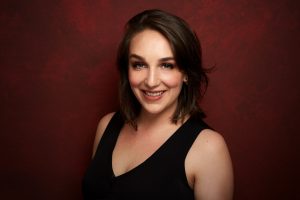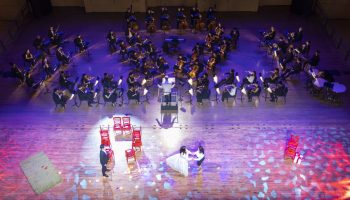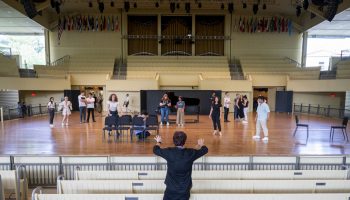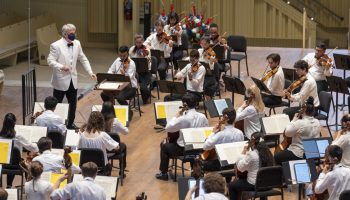As what she calls a “baby opera director” Diane Machin’s first priority when approaching a new project is making sure she has the story and score down pat. Sometimes this means getting a little creative, like last summer, when she was preparing to assistant direct Mozart’s The Marriage of Figaro for Chicago Summer Opera.

“There are so many characters and so many twisted plotlines, and I felt like I couldn’t quite grasp it,” Machin said. “So I sat down and watched the show and had stick figures (for each character) I moved around in front of me.”
Machin will be one of four directors speaking at this week’s Chautauqua Opera’s Behind the Scenes series, which will air at noon EDT, Thursday, July 16, on the CHQ Assembly Virtual Porch.
Before the move to a virtual season, Machin, Cassandra Lovering, Keturah Stickann and Sarah Ina Meyers were all slated to direct or assistant direct operas for Chautauqua Opera’s 2020 season. The four will join General and Artistic Director Steven Osgood for a discussion on the process and challenges of directing opera, followed by an audience Q-and-A.
“Stage direction is kind of a moving organism,” Machin said. “It’s always changing and fluctuating depending on the director and the show and the circumstances.”
This summer she was engaged to direct an opera in Chautauqua County schools as part of the Institution’s arts education outreach and assistant direct Virgil Thomson’s The Mother of Us All and Giacomo Puccini’s Tosca. Keturah and Meyers, respectively, were slated to direct.
During grad school in 2018, Machin, who had previously focused on acting and theater, was offered the chance to direct her first opera project. She was immediately hooked.
“First and foremost, it’s the music, which I had not quite anticipated myself getting that (into),” Machin said. “To be honest, it still surprises me (when) I’ll have a day where I think, ‘I’m going to listen to this whole opera while I’m walking around today instead of whatever’s on my Spotify discover playlist.’”
For her, the biggest difference between approaching a play and an opera has been dealing with works in languages in which she and many of the performers she works with are not fluent.
“You don’t really get that in a play,” Machin said. “You cast actors who have a grasp of the language, and in opera it’s just very different. It’s a lifelong study of a language, of a diction. … (You’re always saying), ‘How can I have a clear idea of the language that someone from 400 years ago was trying to get across? And how am I going to utilize that now in my contemporary 2020 mindset?’”
Her favorite part of directing an opera is collaborating with the singers, particularly young professionals like those in the Chautauqua Young Artists Program.
“I’m in awe of them,” Machin said. “They’re these young people (who) are fascinated by this art form that is incredibly demanding. Sometimes I’ll sit there and watch them debate it like people debate sports, or politics. They’re that passionate about it.”
She hopes Chautauquans can learn something about directing that they can take with them into their daily lives.
“We are in a really unique time in our history, and we have all of these constraints,” Machin said. “I think the mindset of the director is to take these constraints and say, ‘Great, how am I going to still do my work, and work with them and not against them?’”




